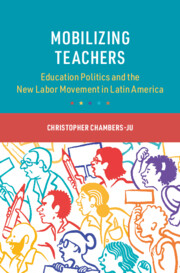Book contents
- Mobilizing Teachers
- Cambridge Studies in the Comparative Politics of Education
- Mobilizing Teachers
- Copyright page
- Dedication
- Contents
- Figures
- Tables
- Preface and Acknowledgments
- Abbreviations
- 1 Why Teachers?
- 2 How Union Organizations Shape Teacher Mobilization
- 3 The Origins of National Teacher Organizations
- 4 Organizational Consolidation in Mexico
- 5 Instrumentalism in Mexico
- 6 Organizational Weakening in Argentina
- 7 Movementism in Argentina
- 8 Factionalism in Colombia
- 9 Leftism in Colombia
- 10 Teacher Politics in Comparative Perspective
- References
- Index
6 - Organizational Weakening in Argentina
Published online by Cambridge University Press: 16 May 2024
- Mobilizing Teachers
- Cambridge Studies in the Comparative Politics of Education
- Mobilizing Teachers
- Copyright page
- Dedication
- Contents
- Figures
- Tables
- Preface and Acknowledgments
- Abbreviations
- 1 Why Teachers?
- 2 How Union Organizations Shape Teacher Mobilization
- 3 The Origins of National Teacher Organizations
- 4 Organizational Consolidation in Mexico
- 5 Instrumentalism in Mexico
- 6 Organizational Weakening in Argentina
- 7 Movementism in Argentina
- 8 Factionalism in Colombia
- 9 Leftism in Colombia
- 10 Teacher Politics in Comparative Perspective
- References
- Index
Summary
This chapter argues that the organizational structure of the Argentine teachers’ confederation (CTERA), with power rooted in provincial and municipal actors, is crucial for explaining why teachers engaged in ongoing protests. It examines the process of union rebuilding in the wake of democratization, after harsh repression during the military regime. Even if newly elected leaders offered little support to the union because of the debt crisis, union leaders made some progress in consolidating CTERA through their own initiatives. The chapter then turns to decentralization under President Carlos Menem as a point of inflection. This undermined national union leaders, weakening their hold on the base. Once organizational hierarchies were weakened, movementism became the union’s political strategy.
- Type
- Chapter
- Information
- Mobilizing TeachersEducation Politics and the New Labor Movement in Latin America, pp. 111 - 130Publisher: Cambridge University PressPrint publication year: 2024

